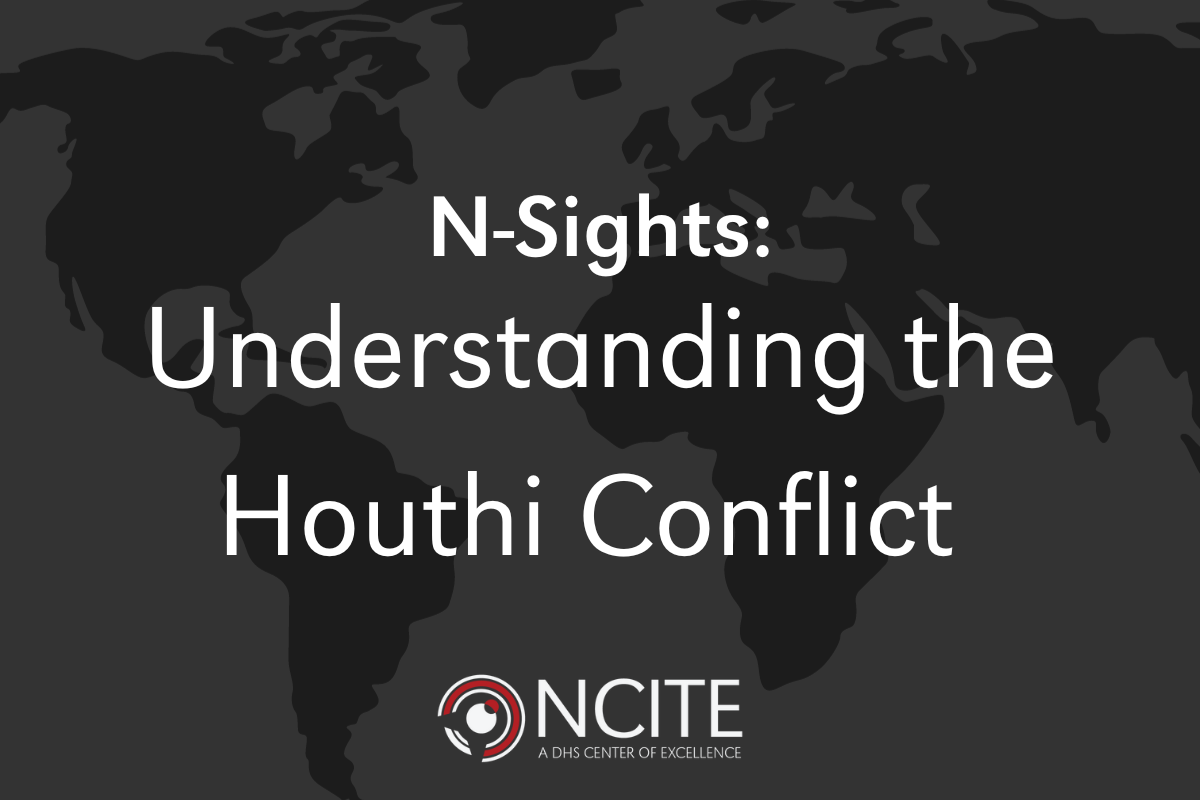LATEST: Understanding the Houthi Conflict
As developments continue in Yemen, stay up-to-date on the situation with critical context and analysis from NCITE experts.
- published: 2024/01/12
- contact: NCITE Communications
- phone: 402.554.6423
- email: ncite@unomaha.edu
- search keywords:
- houthis
- terrorism
- middle east
- red sea

The Houthis, an Iran-backed rebel group based in Yemen, have been attacking ships in the Red Sea and the Suez Canal in support of Hamas in its war against Israel. In response, the United States and the United Kingdom launched missile strikes on Houthi targets.
On Jan. 17, the U.S. announced it would list the Houthis as a specially designated global terrorist group.
Here’s what you need to know.
Key Considerations for the Weeks Ahead
By Austin Doctor, Ph.D.
-
The specially designated global terrorist (SDGT) designation will have little strategic effect on the Houthis, the Axis of Resistance, or Iran in the near term, but it might help put some daylight between the Iran problem and the Houthi problem. Kinetic attacks – like the U.S. and U.K. strikes last week – were likely necessary but were never going to be sufficient to deter the Houthis. This is a group hardened by years and decades of vacillating but often intense counterinsurgency pressure.
-
The SDGT designation is deserved but shows a relatively delicate touch by the U.S. To be sure, the SDGT designation opens new means of directly challenging some of the Houthi’s domestic political objectives (e.g., international legitimacy, viability). But it is unclear whether and how the tools that come with this designation will be used to affect the thing the Houthi’s care about most: control. Absent this, the SDGT may act counterproductively as a “badge of honor” for the group to tout to their local supporters. It's unlikely that the Houthis will throw in the towel any time soon.
-
Much depends on how the Houthis respond. The peace talks that have moved forward quietly over the past couple years now face potential delays. As a country, Yemen is dependent on foreign cooperation, and the SDGT designation creates pragmatic avenues for isolating an aspiring Houthi political body – with only Houthi leaders to blame.
-
The U.S. decision to take the SDGT approach, while choosing not to return the Houthis to the foreign terrorist organization (FTO) list, leaves that additional measure on the table for future punitive action. It also makes it feasible for elements of the international community to target aid on the massive humanitarian needs in Yemen.
-
The United Nations has estimated that 21.6 million people remain in need of humanitarian assistance.
Background
By Clara Braun, Ph.D. Candidate
Who are the Houthis?
-
Origins and Leadership: Ansar Allah (Partisans of God) – also known as the Houthis – are a rebel group based in Yemen. The group originated in the northern part of Yemen in the late 1980s and is primarily composed of Zaidi Shia Muslims. The Houthi movement takes its name from its founder, Hussein Badreddin al-Houthi, who was killed in 2004. The group is currently led by his brother, Abd al-Malik al-Houthi.
-
Houthi Aims: The group’s espoused grievances are rooted in political, economic, and religious issues. Their ambition is to control Yemen as a key node of influence. The Houthis currently control territory hosting approximately two-thirds of the Yemeni population.
-
Status of the Houthi Conflict: The decades-long conflict in Yemen, which escalated significantly in 2014, has involved the Houthi rebels fighting against an internationally recognized Yemeni government and a coalition of regional states led by Saudi Arabia. The conflict has resulted in a complex humanitarian crisis, with widespread displacement, food shortages, and other challenges affecting millions of Yemeni citizens. The situation is characterized by multiple factions and international involvement, making it a complex and volatile geopolitical issue.
-
Houthi Partnerships: The Houthis are part of the Iranian-led network known as the Axis of Resistance. They have active partnerships with other Axis members, including Hezbollah and Iraqi Shi’a militias, among others. Iranian and Axis officials coordinate financial, military, and political support to the Houthis, increasing group capabilities.
What's going on?
-
Following weeks of Houthi-led attacks on vessels in the Red Sea, the United States and the United Kingdom have responded, launching military strikes on Houthi targets in Yemen. This was the first time the U.S. military conducted strikes against the Houthis since October 2016.
-
On Jan. 17, the Biden administration announced the U.S. would now list the Houthis as a specially designated terrorist group.
-
The Houthis have said they will continue to attack Israel-linked ships even after the strikes on Yemen by the U.S. and U.K.
-
“These strikes are in direct response to unprecedented Houthi attacks against international maritime vessels in the Red Sea — including the use of anti-ship ballistic missiles for the first time in history,” U.S. President Joe Biden said in a statement, adding, “I will not hesitate to direct further measures to protect our people and the free flow of international commerce as necessary.
Why does the U.S. care?
-
The Red Sea and Suez Canal account for 30% of the world’s container ship traffic and, since the onset of attacks, several shipping companies have said they will divert ships across Africa instead.
-
The U.S. response is part of the broader need to degrade and deter the violent threat posed by the Iranian-backed Axis of Resistance. But the move is highly sensitive, as the Biden administration likely wants to avoid escalation and getting further entangled in a regional conflict in the Middle East.